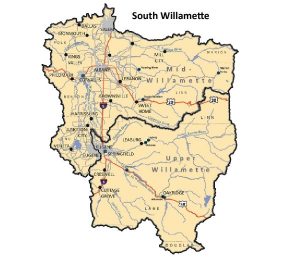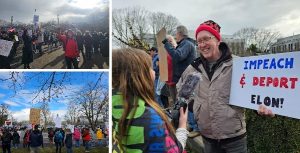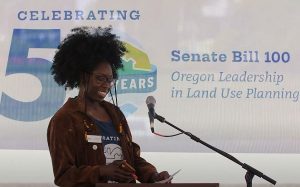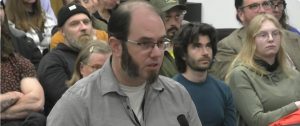Encircle Films panelists describe life at Chemawa Indian School
8 min read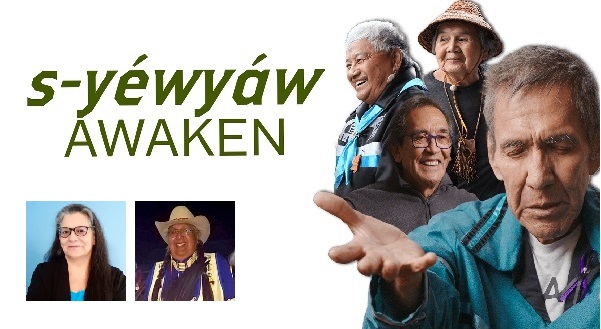
Curtis Blankinship: In a historic move, Canada’s House of Commons unanimously recognized the Indian residential school system as genocide on October 27, 2022. The resolution builds on the 2015 contribution of the Truth and Reconciliation Commission of Canada. The Commission was barred from using the term genocide for legal reasons and instead called the practice cultural genocide.
[00:00:26] The recent motion was introduced by Member of Parliament Leah Gazan. The move follows Pope Francis’s acknowledgement during his visit to Canada of the ongoing trauma and damage done by residential schools to Indigenous communities. It’s possible that the Pope’s reference to the Indian residential school as genocide swayed some members of Parliament to agree to this new resolution because this was the second time the concept was introduced to the House.
Screened at the Nov. 21, 2024 monthly Encircle Films event, the film s-yéwyáw Awaken, infused by Indigenous ceremony, walks alongside the process of intergenerational healing.
[00:01:07] Calling the audience’s attention to the filmmaking process of the narrative collaboration between an Indigenous and settler team, this character-driven documentary connects the transformative stories of three Indigenous multimedia changemakers and their four elders.
[00:01:23] Bob Tom became the first general manager for the Confederated Tribe of Siletz after the tribe regained federal recognition and restoration of their tribal status and returned to live in Salem. The Salem area is where Bob was born in the hospital at Chemawa Indian school when his parents and family lived in Siletz. He moved to Salem eight years later. Bob lived in Chemawa campus.
[00:01:49] Three years later, he worked at Chemawa during his high school years, as well as several years after high school, he coached Chemawa junior varsity basketball for three years, and emceed many Chemawa powwows. He was part of the Salem Intertribal Drum Group and sang at several Chemawa graduations. During the Q and A, after the film, he said the abuse wasn’t as obvious when he was there.
[00:02:13] Robert P. “Bob” Tom (Grand Ronde Tribal member): This was in the middle of August and the first few days, these young people from the first to the 12th grade would come out to the football field and they’d get in a big circle and they would start singing, all of them that knew the song. All of them would sing these beautiful songs. And then pretty soon, attendants would come out there with broomsticks and start beating on them, making them quit in their circle and making them quit singing.
[00:02:50] Four nights they would do that until they finally quit. And at the high school, you know, I got spanked by my mom with sticks, but it was when I did something wrong. I couldn’t understand why these kids were getting beat when they sang and they danced in their own way. And there were non-Indian and Indian staff there doing that.
[00:03:26] I couldn’t understand it. I had to ask my dad. And he said that these institutions, these boarding schools, they create their own personality and their own sense of what’s right or wrong, what’s acceptable. And sometimes it’s not very good, just like that. There were Indian people beating these little kids.
[00:04:04] And so, the federal government, IHS, BIA, it’s easier for me to understand what goes on, because these institutions create their own personality. People go to work for them, they work for them 10 years, they’re not the same person anymore.
[00:04:30] At the same time, Chemawa Indian School produced some of the best Indian politicians in the United States. Our organization here in the Northwest, Affiliated Tribes of Northwest Indians, wrote federal legislation that went through Congress, Public Law 93-638. Chemawa graduates and the Northwest tribes worked together good. These politicians were graduates of Chemawa, and their wives were from one of the tribes they met at Chemawa, and so all of a sudden, these big tribes and these little tribes working together to help the people, and they did a lot of good things here in the Northwest.
[00:05:32] So my, I coached at Chemawa, I emceed powwows at Chemawa. So the experiences are good and bad. But at least my dad told me a way to understand it. Well, not to judge people, but just to understand how, you know. that can happen. So my experience at Chemawa Indian School has mostly been great. I met Code Talkers that went to school, that worked there at Chemawa Indian School, had wonderful conversations with them.
[00:06:19] And so, Chemawa School is active right now. They just finished football season, and undoubtedly have a great fast-breaking basketball team. And they’re still taking the kids out around to the ocean and to other places, and broadening their life, and so, currently, as far as I know, Chemawa is doing a good job.
[00:06:52] Chemawa kids: I used to have a Chemawa crew in the morning and an Alaskan crew in the afternoon who would do projects around Chemawa. When I had the Navajo, they would try to teach me words, Indian words. But we had a lot of Navajo staff, so I could go to them and say those words, just to make sure they weren’t, you know.
[00:07:25] And so I could go and I’d ask Navajo workers, ‘What does this word mean?’ ‘Oh, don’t say that in the crowd, you know.’ The Alaskan, we didn’t have any staff, so I didn’t let them teach me any words. But it used to be fun. The Navajos, they had a good basketball team, but it used to be fun. They’d talk in Navajo during the game.
[00:07:51] And they would look at somebody and talk and then laugh. And that person just knew they were talking about them, you know. And they’d do it to the ref. But it really bothered the other team and the ref that these kids could talk in their own language out there on the floor. You could hear them talking, you know.
[00:08:10] Curtis Blankinship: Angela Noah, recent graduate of Chemawa, says things have changed for the better to the point that the school has become a necessary asset to the community.
[00:08:19] Angela Noah (White Mountain Apache and Choctaw, Young Elders Podcast): I can offer kind of like, I just graduated, or I graduated from Chemawa in 2016 now. And I recall like, the first time seeing the ocean. I remember we were chillin’ on this sand, and I thought construction was going on over this big ol’ dune.
[00:08:41] And they’re like, ‘No, that’s the ocean, we’re going to go over there.’ And I just remember being, like, from Southwest, and I was put in a dorm of four, there was four of us, and they were all from my reservation, we had never seen the ocean, and I just remember all of us holding hands, and just, like, straight out of a young adult film, just running to the ocean.
[00:09:01] And that for me, is kind of when, education, just taking that seriously. I’m the first in my family to graduate high school, and the first to be in college. So I take that very seriously. My family pushed me to go far in school. They always say, ‘Your education is the one thing they can’t take away from you.’
[00:09:27] So I’ve been trying to reframe that. I’ve started the Young Elders Podcast that I’m a host of and I hope to hold space for things like this intergenerational connectedness. Ancestors are here. There’s a need for our stories to be told and I’m learning how to tell mine. So I want to hold space for that.
[00:09:50] And really just listening to some of the stories on the screen tonight was really heavy. And I just hope that you all, if it made you uncomfortable, sit in that, and after tonight, don’t just be a checkmark to do your DEI, put in the community. Come to the Longhouse, you know, on campus, come be in community, that’s how you do this kind of work.
[00:10:16] If you want to help push healing for us (and we need you to), that’s the way, just show up in community. Don’t try and show up with your own agenda, don’t take over, just ask what needs to be done. And we will welcome you, we are welcoming people. That’s what Chemawa has taught me, and again, I’m learning how to tell my story, so I’m very grateful that I can look to leaders, and that I’ve been brought into these kind of spaces. But I hope to go back to Chemawa, to be able to, in February, they’ll have their birthday powwow, and you all are welcome to that too, you know, go see what that’s like.
[00:10:55] They just crowned our new Miss Chemawa a couple weeks ago. We went to the Veterans Day powwow, so it’s always nice just to go in and see old staff. That’s my family, you know. Those people taught me how to take care of myself, how to keep my room clean, be in good community. My mom, she wasn’t there to do that for me.
[00:11:15] So these dorm staffs did a good job. When I was there, they were Native dorm staffs. They still are now, and now we’re getting Native teachers too. And I think that a lot of those students are coming from our program at the University of Oregon, our Native graduate teaching program, Sapsik’ʷałá.
[00:11:32] So that’s really cool to see when you enter a classroom. You see someone who looks like you now. And it’s just really great to see that. It’s changing every year, it’s getting better. And I think there’s about 400 beds in the dorms, so about 400 students. When I was there, 75% were from my rez, and I was like, ‘Oh, this is where you all went.’
[00:11:53] Because Chemawa had a bad rep back home: ‘It’s where all the bad kids go,’ is what my mom said. But I wanted to prove that good things could come from my community and Chemawa, so I worked really hard and, I mean, I couldn’t get a break as an older sibling, like, you kind of have to. So, I tried my best and all of my siblings, they also went to Chemawa too.
[00:12:13] So, Chemawa, we call it ‘home away from home.’ So if there’s a powwow community event, please go up and check it out. And come connect with us at the Longhouse here in campus too.
Curtis Blankinship: For KEPW News, I’m Curtis Blankinship.

